By Upendra Mishra
Three fears scare the hell out of us all: loss of wealth, loss of reputation and the mother of all fears—death. Wealth can be regained, and reputation can be rebuilt, but nothing remains after the death. What is death? What happens after death? How must we all face it one day?
For a child, death can be even more puzzling. When I was a little kid, I had no idea about death. I thought everything will remain the same forever and everyone will look the same endlessly. I even did not know that I had lost my own mother when I was about two or three years old. I found that out when I was eight or nine. No one ever talked about death in the family. People died, they were cremated, various rituals were performed, and life returned to normal.

It is only after midlife, we slowly start to become aware that death is something real, almost like a solid rock that you can see from a distance and slowly you are getting nearer to this. The first time, however, I had a question about the death was when I was in the 11th grade. I had traveled to a temple of Sampoorna Devi in hills of northern Uttar Pradesh with my aunt and uncle, who had raised me and for all practical purposes were like my parents.
As we were getting closer to the temple on the hill, there were rows of people suffering with leprosy sitting on both sides of the path to the temple. They were begging, looking at visitors and shouting at the top of their voice: tum mar jao (you die.) To a teenager, someone wishing for someone to die openly and no one doing anything about it looked very awkward.
When we were returning home from the trip, I asked my uncle why those beggers were wishing everyone to die. My uncle laughed and told me that they were wishing for our ego to die, not the people. Again, I had no idea what the ego was then. My uncle was a government employee, my aunt a house wife and I went to school. We lived in a two-bedroom apartment and helped each other with household work. Our life was peaceful and happy. There was no place for ego.
Now when I look back, I realize that I was full of ego, though. Sometimes, ego can give you an initial boost, focus, purpose and goal in life to do something or prove something. May be it was my ego that plucked me away from my remote village and took me to Allahabad University, then to JNU in New Delhi and then to Latin America and the US. In the process, my unconscious ego became a habit and now had become a destructive force and had started to act in reverse. It took some time for me to realize the harm my ego was doing to me.
Much later in my life I finally understood the negative and destructive force of ego and its relationship with death: death not only of physical body but death of anything I liked, loved or wanted to do.
Katha Upanishad
In the ancient Indian Indian scripture of Katha Upanishad (also known as Kathopanishad), a young teenager Nichiketa is condemned by his angry father to Yama, the God of Death.
When Nachiketa reaches the gates of palace of the God of Death, he does not find the God but decides to wait for him anyway. The God of Death returns after three days during which period all Nachiketa does is patiently wait for Yama without any food and water. The God of Death feels bad for Nachiketa, and grants him three boons. Yama tells Nachiketa: “You have waited in my house for three days without hospitality, therefore ask three boons from me.”
Nachiketa first asks that his father’s anger against him may pass away and that he will be kind to him and recognize him when he returns home. For the second boon, Nachiketa wants to know about a sacrifice that takes people to heaven.
For his third boon, Nachiketa wants to learn about death. He asks Yama: When a person dies, there arises this doubt: “He still exists,” say some; “he does not,” say others. I want you to teach me the truth.”
God of Death
Yama does not want to answer this question. He says death had been a mystery even to the gods, and asks Nachiketa to ask for some other boon.
“Nachiketa, be the ruler of great kingdom, and I will give you the utmost capacity to enjoy the pleasures of life. Ask for beautiful women of loveliness rarely seen on earth, riding in chariots, skilled in music, to attend to you. But Nachiketa, don’t ask me about the secret of death,” Yama tells Nachiketa.
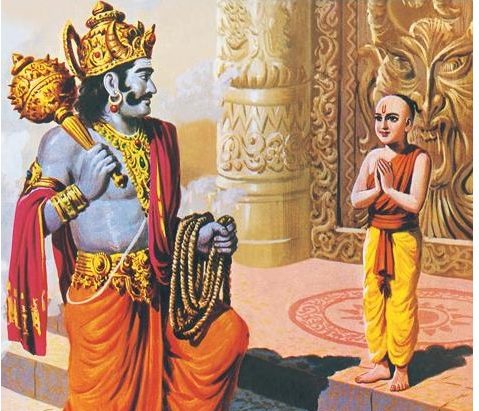
Nachiketa knows what he wants. He is determined and does not get distracted. Nachiketa replies: “These pleasures last but until tomorrow, and they wear out the vital powers of life. How fleeting is all life on earth! Therefore, keep your horses and chariots, dancing and music, for yourself.” He asks: “How can mortals be made happy by wealth. How can we be desirous of wealth when we see your face (death) and know we cannot live while you are here? This is the boon I choose and ask you for.”
Yama is pleased with Nachiketa’s answer, his determination and fearless and doubtless mind, and teaches him the mystery of death and immortality, and most importantly about the Self.
“Those who realize the Self are forever free from the jaws of death,” Yama says. “We live not by the breath that flows in and out, but by him who causes the breath to flow in and out…Eternal joy is their who see the Self in their own hearts. To none else does it come.”
Nachiketa asks: “How can I know that blissful Self?”
The Ego
Answers Yama: “There are two selves: the separate ego and the indivisible Atman. When once rises above I and me and mine, the Atman is revealed as one’s real Self.”
The ego, however, is a bigger hurdle in realizing the Self. Yama explains this through a hierarchy of things with the Brahman or the Self sitting on the top:
- Brahman/Self
- Un-manifested cause
- Ego
- Intellect
- Mind
- Senses
Even if one is able to control one’s senses, regulate one’s mind, and use intellect wisely, one may not realize the Self without the understanding or getting rid of ego.
Yama also explains the relationships among various elements of life through the example of chariot and horses.
Body, Chariot and Horse
“Know the Self as lord of the chariot,
The body as the chariot itself,
The discriminating intellect as
The Charioteer, and the mind as reins.
The senses, say the wise, are the horses;
Selfish desires are the roads they travel.
When the Self is confused with the body,
Mind, and senses, they point out, he seems
To Enjoy pleasure and suffer sorrow.”
Yama adds:
“Who have discrimination, with a still mind
And a pure heart, reach journey’s end,
Never again to fall into the jaws of death.”
Ego is so subtle, so smart, so overwhelming, and so powerful that you cannot even imagine its destructive potency. When you give something to someone, it tells you I gave; when you love someone, it tells you I loved; when you renounce your possessions, even then it tells you “look I renounced everything I had.” I am better, I am good, I have this and that, and it goes on attaching itself to everything and weaving its own tapestry of delusional reality and falsehood.
We may call this our ego trip, and we all have this—some less, some more. The misfortune is that ego completely clouds our innocence, purity, our true self and who we really are at the core. Once we remove the veil of ego, a new world opens and we reunite with our true Self.
Probably, that is what self-realization or knowing oneself is. There is just one person—same everywhere. No manipulation, no strategies, no doubt, no fear—just being self—everywhere, all the time and in all circumstances. Nothing to impress, not impressed by anything, nothing bothers and nothing makes euphoric. Firm, peaceful and fearless. But this we realize only when we look inside ourselves.
“Your vision will become clear only when you can look into your own heart. Who looks outside, dreams; who looks inside, awakes,” said Carl Jung.
(Mr. Mishra is managing partner of the Waltham, MA-based integrated inbound marketing and PR firm The Mishra Group. He writes about his three passions: marketing, scriptures and gardening.)





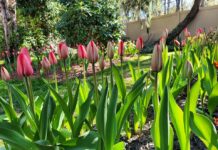
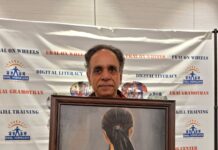
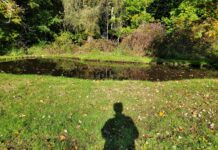
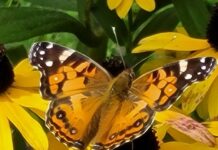
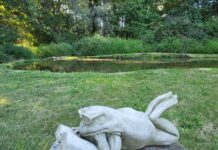
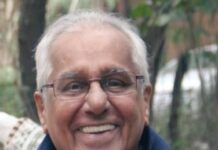





I love your passion for the spirit of self and in search of the infinite – never ending cycle
The day one is born one is looking for that and the day one is on death bed looking for that and reborn and cycle goes on for liberation
Best